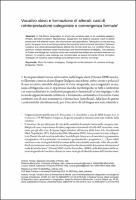Chapter Vocativo slavo e formazione di alterati: casi di reinterpretazione categoriale e convergenza formale
| dc.contributor.author | Trovesi, Andrea | |
| dc.date.accessioned | 2024-04-02T15:51:09Z | |
| dc.date.available | 2024-04-02T15:51:09Z | |
| dc.date.issued | 2023 | |
| dc.identifier | ONIX_20240402_9791221502169_229 | |
| dc.identifier.issn | 2612-7679 | |
| dc.identifier.uri | https://library.oapen.org/handle/20.500.12657/89260 | |
| dc.language | Italian | |
| dc.relation.ispartofseries | Biblioteca di Studi Slavistici | |
| dc.subject.classification | thema EDItEUR::C Language and Linguistics::CF Linguistics | |
| dc.subject.classification | thema EDItEUR::D Biography, Literature and Literary studies::DS Literature: history and criticism | |
| dc.subject.other | Word formation strategies | |
| dc.subject.other | Categorial reinterpretation of vocative endings | |
| dc.subject.other | Bulgarian | |
| dc.subject.other | Polish | |
| dc.title | Chapter Vocativo slavo e formazione di alterati: casi di reinterpretazione categoriale e convergenza formale | |
| dc.type | chapter | |
| oapen.abstract.otherlanguage | In the Slavic languages, in which the vocative case is an unstable category (Polish, Serbian-Croatian, Macedonian, Bulgarian), the explicit vocative mark is better preserved with altered nouns, like diminutives and pejoratives. Taking this as the starting point, the paper aims at verifying whether the semantic and functional “attraction” between vocative and diminutives/pejoratives affects the formal level too, i.e. whether there are points of contact between case morphology and word formation strategies. The analysis of Polish and Bulgarian vocative forms has revealed that these two domains intersect as follows: 1) vocative case endings are reinterpreted as lexical formants; 2) the formation strategies of vocative case endings and altered nouns tend to converge. | |
| oapen.identifier.doi | 10.36253/979-12-215-0216-9.06 | |
| oapen.relation.isPublishedBy | bf65d21a-78e5-4ba2-983a-dbfa90962870 | |
| oapen.relation.isbn | 9791221502169 | |
| oapen.series.number | 54 | |
| oapen.pages | 9 | |
| oapen.place.publication | Florence |

